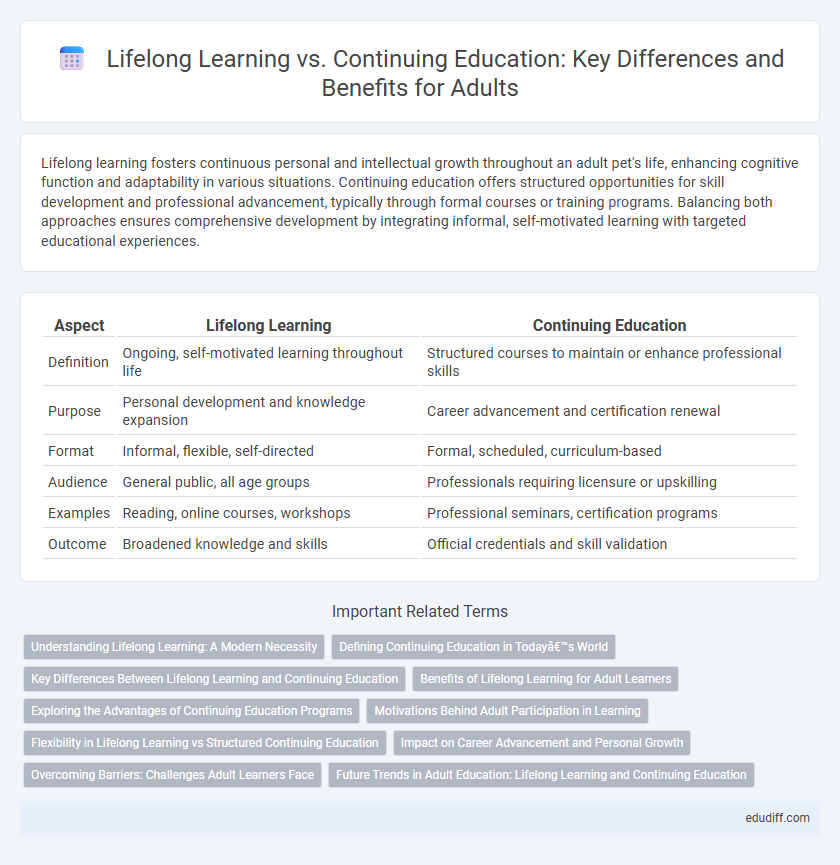Lifelong learning fosters continuous personal and intellectual growth throughout an adult pet's life, enhancing cognitive function and adaptability in various situations. Continuing education offers structured opportunities for skill development and professional advancement, typically through formal courses or training programs. Balancing both approaches ensures comprehensive development by integrating informal, self-motivated learning with targeted educational experiences.
Table of Comparison
| Aspect | Lifelong Learning | Continuing Education |
|---|---|---|
| Definition | Ongoing, self-motivated learning throughout life | Structured courses to maintain or enhance professional skills |
| Purpose | Personal development and knowledge expansion | Career advancement and certification renewal |
| Format | Informal, flexible, self-directed | Formal, scheduled, curriculum-based |
| Audience | General public, all age groups | Professionals requiring licensure or upskilling |
| Examples | Reading, online courses, workshops | Professional seminars, certification programs |
| Outcome | Broadened knowledge and skills | Official credentials and skill validation |
Understanding Lifelong Learning: A Modern Necessity
Lifelong learning embodies a continuous, self-motivated pursuit of knowledge essential for adapting to the rapid changes in today's job market and personal development. Unlike continuing education, which often targets specific skills or certifications within a defined timeframe, lifelong learning integrates diverse educational experiences throughout an individual's entire life. Emphasizing critical thinking, adaptability, and digital literacy, lifelong learning fosters resilience and sustained competence in an ever-evolving global economy.
Defining Continuing Education in Today’s World
Continuing education in today's world refers to structured learning activities that adults engage in after formal education to enhance professional skills, acquire new knowledge, or meet certification requirements. It often includes workshops, online courses, seminars, and certification programs tailored to evolving industry standards and technological advancements. This dynamic approach supports career growth and lifelong adaptability in rapidly changing job markets.
Key Differences Between Lifelong Learning and Continuing Education
Lifelong learning encompasses a broad, self-motivated pursuit of knowledge throughout an individual's life, often informal and driven by personal interests or professional growth. Continuing education refers to structured, formal courses usually designed to enhance specific skills or qualifications related to a career or academic requirements. The key differences lie in the scope, motivation, and format: lifelong learning is ongoing and holistic, while continuing education is episodic and focused on certification or credentialing.
Benefits of Lifelong Learning for Adult Learners
Lifelong learning enhances adult learners' cognitive flexibility, enabling them to adapt to evolving job markets and technological advancements. It fosters critical thinking and problem-solving skills, promoting personal growth alongside career development. Embracing lifelong learning also improves emotional intelligence, leading to greater resilience and better social interactions in diverse environments.
Exploring the Advantages of Continuing Education Programs
Continuing education programs offer flexible learning schedules tailored for adults balancing work and personal commitments, enabling skill enhancement without disrupting daily routines. These programs often provide industry-relevant certifications that improve career advancement opportunities and salary potential. Access to updated knowledge and practical training through continuing education fosters professional growth and adaptability in a rapidly evolving job market.
Motivations Behind Adult Participation in Learning
Adults engage in lifelong learning driven by intrinsic motivations such as personal growth, intellectual curiosity, and the desire to adapt to evolving life roles. Continuing education often attracts learners seeking specific career advancement, skill enhancement, or credential acquisition to meet professional demands. Understanding these distinct motivations helps tailor educational programs that effectively support adult learners' goals and sustain engagement over time.
Flexibility in Lifelong Learning vs Structured Continuing Education
Lifelong learning offers unmatched flexibility, allowing adults to tailor educational experiences to their schedules and interests without the constraints of formal timelines. Continuing education typically follows a structured curriculum with fixed schedules, designed to meet specific professional or certification requirements. This contrast makes lifelong learning ideal for self-motivated individuals seeking personalized growth, while continuing education suits those pursuing targeted career advancement.
Impact on Career Advancement and Personal Growth
Lifelong learning fosters continuous skill development and adaptability, crucial for career advancement in rapidly changing job markets. Continuing education provides targeted knowledge and certifications that enhance professional qualifications and open opportunities for promotion. Both approaches contribute to personal growth by expanding intellectual horizons and building confidence in problem-solving abilities.
Overcoming Barriers: Challenges Adult Learners Face
Adult learners encounter various obstacles such as time constraints, financial limitations, and balancing family or work responsibilities that hinder their progress in lifelong learning and continuing education. Addressing these barriers involves flexible scheduling, affordable course options, and supportive learning environments tailored to adult needs. Overcoming these challenges enhances skill acquisition, career advancement, and personal development for mature students.
Future Trends in Adult Education: Lifelong Learning and Continuing Education
Future trends in adult education highlight the growing integration of digital platforms and personalized learning pathways, enhancing accessibility and flexibility in lifelong learning. Emphasis on skill-based training and micro-credentials addresses the evolving job market demands, fostering continuous upskilling and reskilling. Data analytics and AI-driven tools increasingly support adaptive learning experiences, promoting sustained engagement in both lifelong learning and continuing education.
Lifelong Learning vs Continuing Education Infographic

 edudiff.com
edudiff.com